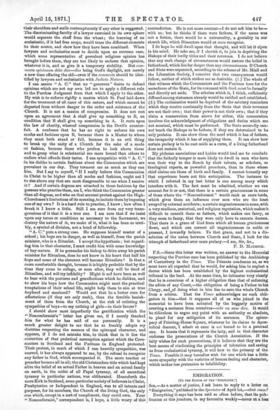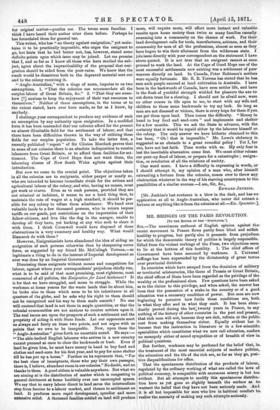EMIGRATION.
[TO THE EDITOR OF THE H BPSOTATOR:1 SIR,—As a matter of justice, I ask leave to reply to a letter on "Emigration," published in the Spectator of April let,—absit omen! Everything it says has been said so often before, that its pub- lication at this juncture, in my favourite weekly—never at a loss
for original matter—puzzles me. The terms seem familiar. I think I have heard their author utter them before. Perhaps he has formulated them for general use.
This writer, who has " no theory against emigration," yet main- tains it to be practically impossible, who urges the emigrant to go, but hints that he had better not, has, however, stated some definite points upon which issue may be joined. Let me premise that I, and so far as I know all those who have studied the sub- ject, agree about the impracticability of the proposal that emi- gration should be aided from the poor-rates. We know that the result would be disastrous both to the depraved material sent out and to the colony receiving it.
" Anglo-Australian," with a tinge of acorn, imputes to us two assumptions. 1. "That the colonies can accommodate all the surplus labour of Great Britain, &c." 2. "That they are some- how [?] anxious to keep the enjoyment of their vast resources to themselves." Neither of those assumptions, in the terms or to the extent stated, have ever been made, so far as I know, by anybody.
I challenge your correspondent to produce any evidence of such an assumption by any authority upon emigration. In a modified form it has been contended that our colonies afford for the present an almost illimitable field for the settlement of labour, and that there have been difficulties thrown in the way of utilizing those fields for our surplus population. To take the latter first, a recently published " report " of Sir Clinton Murdoch proves that in some of our colonies there is an absolute indisposition to receive labourers from Great Britain, or to afford them facilities for set- tlement. The Cape of Good Hope does not want them, the labouring classes of New South Wales agitate against their introduction.
But now we come to the crucial point. The objections taken in all the colonies are to emigrants, either pauper or nearly so, who are intended to become immediate rivals for the artizan and agricultural labour of the colony, and who, having no means, must get work or starve. Even as to such persons, provided they are not criminal or indolent, it seems to me a hard thing that, to maintain the rate of wages at a high standard, it should be pos- sible for any colony to refuse them admittance. We hand over valuable lands to a few thousand persona, who in return impose tariffs on our goods, put restrictions on the importation of their fellow-citizens, and live like the dog in the manger, unable to develop all they have, yet barking at any who seek to share it with them. I think Cromwell would have disposed of these obstructions in a very summary and healthy way. What would Bismarck do with them ?
However, Emigrationists have abandoned the idea of aiding an emigration of such persons otherwise than by cheapening ocean fares, as suggested by my friend Mr. McCullagh Torrens,—as legitimate a thing to do in the interest of Imperial development as ever was done by an Imperial Government !
Dismissing these emigrants without means and competitors for labour, against whom your correspondents' prejudices chiefly run, what is to be said of that most promising, most righteous, most economical of all policies, the Emigration for Land Settlement? It is for that we have struggled, and mean to struggle. While the workman at home yearns for the waste lands that lie about him, he looks also to those which seem to be his inheritance in all quarters of the globe, and he asks why his right to them should not be recognized and his way to them made smooth ? No one will contend that land is not there in ample quantities, or that the colonial communities are not anxious to receive settlers upon it. The real issues are upon the prospects of such a settlement and the propriety of aiding it with State funds. Let our opponents meet us always and fairly on these two points, and not argue with us points that we own to be inarguable. Now, upon these the " Anglo-Australian " gives forth no uncertain sound. He says :— " The able-bodied English labourer who arrives in a new country cannot proceed at once to clear the backwoods or bush. Even if land be given him, he must have money in hand to buy food and clothes and seed-corn for his first year, and to pay for some shelter till he has put up a house." Further on he represents that, " For the best class of immigrants, those who pay their own passages, there is, I believe, abundant room in our colonies." No doubt, and no thanks to them. A good citizen is valuable anywhere. But what we are aiming at is the distribution of matter which is congesting to general detriment at home healthily over our unoccupied spaces. We say that to carry labour direct to land saves the intermediate step from famine to a labour market, and thence to settlement on land. It produces more rapid development, speedier and more extensive relief. A thousand families settled on land will produce more, will require more, will effect more instant and valuable. results upon home society than twice as many families casually swarming into a community on the chance of work. For their land development calls for tools, manufactures, artizans, and their community for men of all the professions, almost as soon as they have begun to win their allotment from the wilderness state. 1 join issue directly with your correspondent on the statement I have above quoted. It is not true that an emigrant cannot at once- proceed to work the land. At the Cape of Good Hope one of the most successful settlements now existing was a settlement of poor- weavers directly on land. In Canada, Peter Robinson's settlers- were equally fortunate. Mr. R. R. Torrens has stated that he has. seen such people succeed at land cultivation in Australia. I have been in the backwoods of Canada, have seen settler life, and have in the flush of youthful strength wielded for pleasure the axe to• cut down trees for a clearing. I should not be afraid now, were no other course in life open to me, to start with my wife and children to those same backwoods to try my luck. So long as men are not diseased or vicious, there is every hope for them if you. can get them upon land. Then comes the difficulty. "Money in hand to buy food and seed-corn " and implements and shelter- for a few months. This we ask the State to advance, with the. certainty that it would be repaid either by the labourer himself or the colony. The only answer we have hitherto obtained to this. has been, " Oh ! that is impossible." Mr. Lowe's obduracy is. suggested as an obstacle to a great remedial policy ! Yet I, for one, have not lost faith. Time works with us. My only fear is lest the inevitable alternative come first. We must either release our pent-up flood of labour, or prepare for a catastrophe ; emigra- tion, or revolution of all the relations of society.
One word more. I have a difficulty in expressing in words, or I should attempt it, my opinion of a man who, after himself, extracting a fortune from the colonies, comes over to throw any obstruction whatever in the way of his starving countrymen to the possibilities of a similar success.—I am, Sir, &c., EDWARD JENKINS.
[Mr. Jenkins's last sentence is a blow in the dark, and has no application at all to Anglo-Australian, who never did extract a fortune or anything like it from the colonies at 511.—ED. Spectator.),



































 Previous page
Previous page